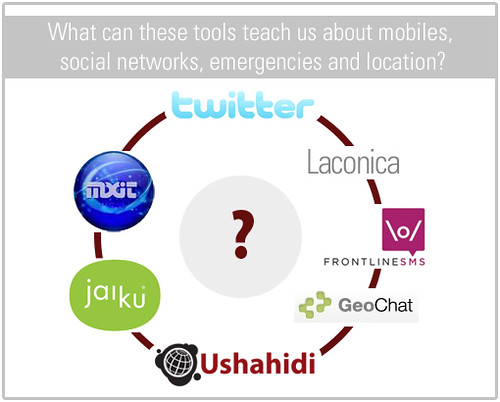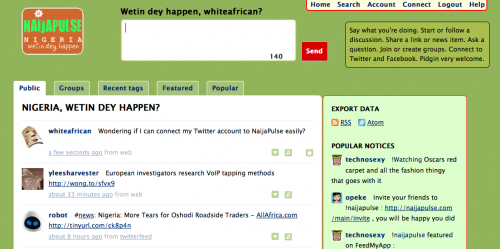I’ve been using Twitter for a while now, and have thought quite a bit about it in Africa. More, I’ve thought about what the ramifications of Twitter pulling out of the global market means, and then thought quite a bit about Jaiku, Laconica and Mxit and various other chat/microblogging applications. There is, without a doubt, a move towards short-form updating via mobile and web, and it needs to be federated.
There’s something missing in this new mobile + web microblogging movement, and I think it’s location.

Why Location Matters
Most of us use these services for updating, and being updated, by our friends and interesting people. That’s the main use, and it will remain so. The truth is, you and I don’t really care to hear what any random stranger is doing, even if they are nearby. However, we do care what is happening on a very hyper-local level in the case of emergency or “big event”.
It’s somewhat like the “pothole theory” that I talked about earlier: you wouldn’t normally care about the pothole on a steet, unless it’s yours. It helps explain why we care about certain things.
If you use Twitter and have an iPhone, you’ll probably be aware of Twinkle – it’s an application that enriches your Twitter experience. In Twinkle, you can set your location and then a certain radius from which to receive twitter updates, even if they’re from perfect strangers. I think that’s the beginning of what we’re talking about.
However, again… I don’t want to just get updates from random strangers in my locale. I want to only receive the ones that are “important” to me. I want to be notified when there is an emergency, major traffic jam or something else pertinent to me.
The “What if…”
What if we created a way that a greater federated system of microblogging applications could also use location as an alert point?
Of course, my current world is colored by Ushahidi, crisis and emergency news coverage. I think of the ability to anonymously send in reports to a system like Ushahidi running in any country, and those who are part of this greater, extended and federated network would be updated – even if that person was unknown and anonymous.

Here’s a use case:
John is a Twitter user in Accra, Ghana. Anne has setup a local Laconica server with 5000 users in the greater Accra area. Eddie is not part of any of these networks, just an average guy with a mobile phone. Ushahidi is running in Ghana.
Users from the Laconica group can setup an “alert” for a specific radius from their location using Ushahidi, linked to their Laconica account.
An earthquake happens and Twitter and the Laconica server are ablaze with dialogue about what is happening. Eddie (our normal guy), sends an alert into the Ushahidi number, along with hundreds of other Ghanians who are not part of Laconica or Twitter. Anne, and the other Laconica users are receiving alerts (web and mobile) from within their set alert radius automatically, from completely anonymous people. Alerts on where people are trapped, who is missing, who is found, where not to go, and where help is needed most.
John, our Twitter user is updating Twitter, but it has no little local implications due to not being able to be used in Ghana (except via web). Local mobile users aren’t receiving his updates, and he isn’t receiving theirs.
I recognize that there are a lot of things going on in this scenario, and it’s imperfect, but it serves as a good setting to discuss some of the shortcomings of the current situation and the possible growth areas for them. It also talks to even bigger ideas and the greater impact in Africa of a real social mobile network that can connect people using only mobile phones and do it as needed.
There are some interesting things to learn and apply from location-specific alternatives to global SMS gateways (like FrontlineSMS), and I wonder where tools such as InSTEDD’s SMS GeoChat can be used here too.
More to come on “getting updates that matter” later, this is just some initial thinking on it. I’d love to hear your thoughts too.


